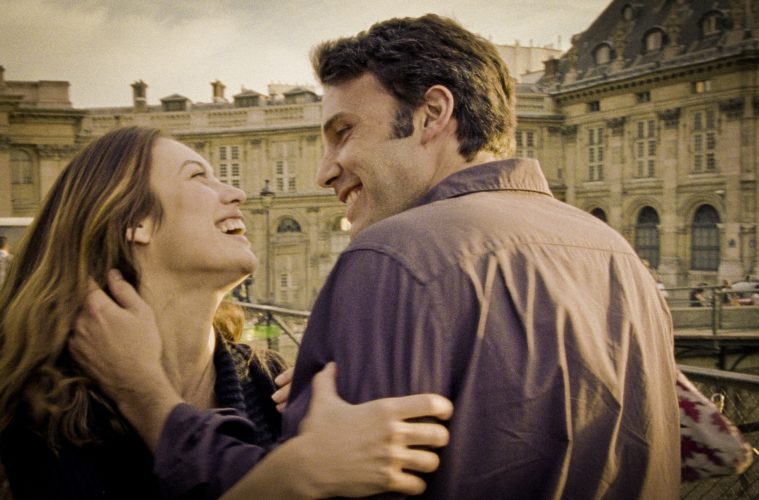For any who thought Terrence Malick‘s The Tree of Life was a divisive piece of cinema, you haven’t seen anything yet. Continuing to strip the very medium of film down to its barest essentials, form once again trumps narrative in his beautiful account of love through memory, To the Wonder. A glimpse into the joy, pain, sacrifice, and compromise of binding oneself to another body and soul, Malick shows us how complicated this concept of physical and emotional connection is. Told through the recollections of its characters, we see the fleeting moments and the decisions made that shaped their lives. It’s a journey through the human psyche, the power of jealousy, and the hope for a happily ever after only achieved when the bumps and bruises of failed relationships heal to make us stronger and less naïve to the infinite struggles lying before us.
We’re shown three people lost and unaware of the path best suited for personal satisfaction. Neil (Ben Affleck) knows not what he wants in life, only the pleasures of the present; Father Quintana (Javier Bardem) engages in a crisis of faith as the God he once knew has disappeared; and Marina (Olga Kurylenko) wants the idyllic life of her dreams without accepting it may very well be an impossible fantasy. Each walks towards salvation only to be brought back into the reality of life’s dangerous choices and messy truths. Love and devotion are fickle just as appearances are deceiving and sometimes what we see isn’t what’s real. We filter everything through our own unique set of experiences, ideology, and desires and often project impulsive thoughts onto innocent actions. What we remember in our minds is almost always riddled by embellishment.

It is Marina who leads us through the majority of this lyrically visceral work via narration reminiscent of a diary entry on the pain of love won and lost. Gorgeous and innocent, her longing to be with Neil is enough to sustain her despite his unwavering ability to never say “I love you” back. Willing to live in the moment and risk everything on a murky future without guarantees, she ecstatically agrees to leave Paris and move to America with him and her daughter Tatiana (Tatiana Chiline). But as the hope for permanence or at the very least reciprocation begins to wane while her Visa expiration approaches, she quietly leaves the dream behind with words left unsaid. There is a spark between these two lovers—a child-like glee when happy and a volatile storm when hurt—yet fate is not yet ready to let them settle down as unfinished business still remains.
And although Neil rekindles an old ember not quite dead with childhood friend Jane (Rachel McAdams), she is but a speed bump on the true journey to the wonderment we all strive to reach. Responsibilities and promises come in to halt the runaway train that is love as conflicted feelings become engaged in a battle with only one victor. A marriage is formed and a new life as one commences with all aspirations optimistically intact until the realities of self-introspection allow the cracks of uncertainty to push through. For Marina this is a way to leave the sorrow of Paris and her now absent daughter living with her father behind and for Neil an opportunity to settle down and relinquish the pain of solitarily moving to places hindered by the hazardous materials he tests their soil to find.
Atop this rather simple, universal trait of hasty love and the confusing of it with lust, To the Wonder unfolds itself as a series of images trying hard to forget the pain. As inferences are made concerning infidelity and the ultimate betrayal of adultery threatens to destroy all shred of what once was and what was hoped to be, we’re reminded of happier times devoid of the suffering wrought by weakness, insecurity, and paranoid delusions speaking more about the accuser’s mindset than the accused. Images repeat often as Marina’s mind recalls the rising tide of water over the muddy bumps of shoreline or the laughter enjoyed when love was still fresh. Malick tells his romance through the silent flicker of cascading memories long passed.

There are some stunning instances that will leave their mark like in The Tree of Life. The floating camera always as though an outsider to the action following behind captures brilliant snapshots of emotions both good and bad. A few still trapped in my head are a scene in the tall grass of Jane’s ranch with her red dress cutting through; a chandelier inside a darkened room at a moment of betrayal; and the glowing of lit arches illuminating a path into the frame. Nature’s glory is juxtaposed by man-made establishments like Sonic and the warm beauty of a church’s stained glass windows help temper the cold concrete steps of a motel’s infidelity. It’s an exercise of image association and the tiny details somehow able to stir up feelings and events long since dormant in the recesses of our mind.
McAdams is radiant as a brief beacon of possibility lost on a sea of devotion while Affleck plays brooding introvert to perfection. Even Bardem excels at being lost on his road to salvation. But if I were to delve deep and discover what To the Wonder meant to me, I’d leave Bardem on the cutting room floor and take Neil and Jane as shadows of themselves trapped inside Marina’s skewed perspective. Kurylenko is our true lead and narrator, explaining her wants and failures with a sadness for what might have been. Any assumptions about Affleck’s Neil are moot when it’s Marina who strays—his not loving her enough perhaps her loving him too much. A mercurial character as at ease twirling giddily through a supermarket as enraged behind locked doors, Kurylenko’s emotional tour de force lifts the minimalist poeticism above the masturbatory self-aggrandizing label many will be quick to use.


